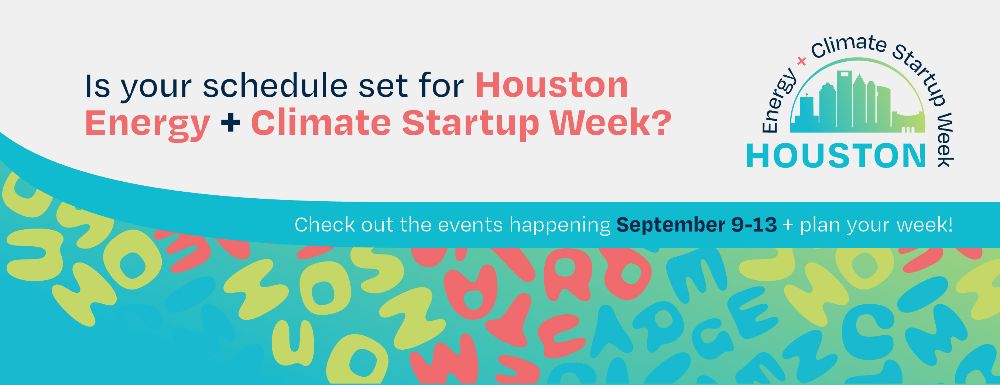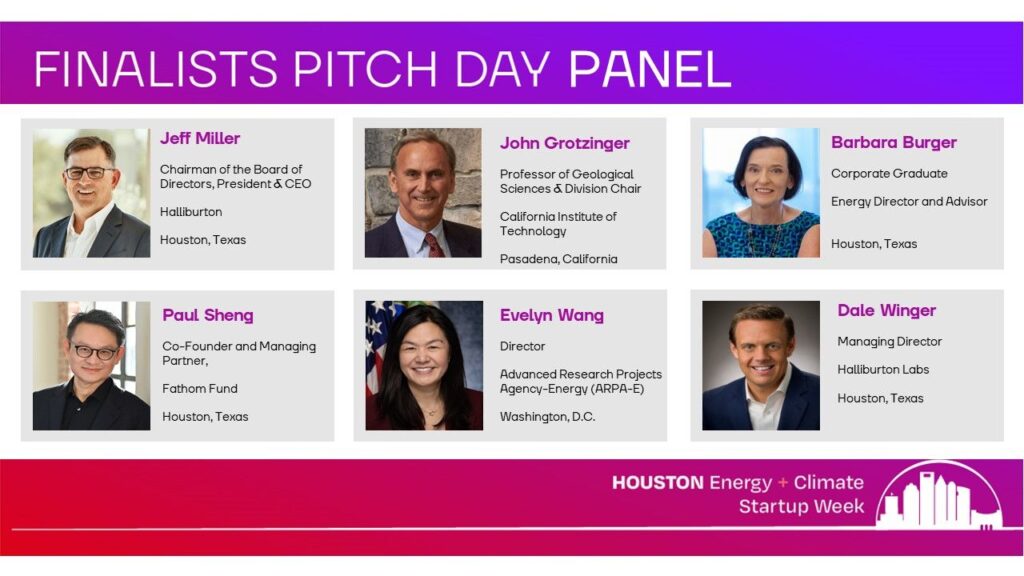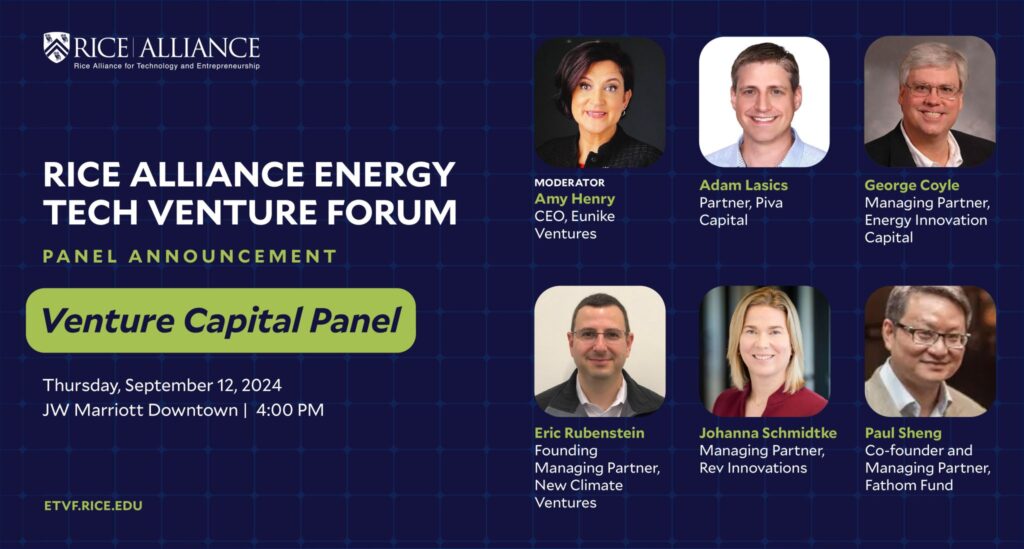Houston Energy and Climate Startup Week is nearly here, and this year’s champions include leaders who are shaping the future of climate technology. Among them is Georgina “Georgie” Campbell Flatter, CEO of Greentown Labs, who steers the world’s largest climate tech incubator as it fuels the next generation of companies racing to solve our biggest environmental challenges.
Georgie stepped into the role in February 2025. Since then, she’s been driving climate innovation forward and championing the next wave of energy startups. Her expertise spans the evolving landscape of climate tech, from emerging technologies to market dynamics.
In our conversation, Georgie dives into Houston’s rising influence in the energy transition – sharing what she’s seeing across today’s climate startup ecosystem and where the biggest opportunities lie.
You’ve built a reputation for developing and scaling impactful global programs at the intersection of energy innovation, climate, and entrepreneurship. What inspired your transition into your latest role as CEO of Greentown Labs?
I’ve built my career around one big idea: making technology matter. You can’t spend a decade at MIT—surrounded by game-changing ideas, learning from rockstars such as Bob Langer, Fiona Murray, and Bill Aulet—without innovation becoming part of your DNA. That experience taught me that while innovation is essential, it’s the intentional innovation infrastructure—incubators, testbeds, incentives, role models and bridges between communities (public, private, NGO, and academia)—that turns ideas into real-world impact.
My ties to Greentown stretch back to the very beginning. The founders are such wonderful people—I know them well—and I’ve also personally experienced the generosity, mentorship, and collaborative spirit of this community. Entrepreneurship is hard, and community matters. Stepping into this role feels like both a privilege and a way to give back.
The next decade belongs to entrepreneurs. Their grit, creativity, and bold ideas will power the innovations, jobs, and partnerships driving the energy transition. As one of our Houston founders put it: “Hard is fun—but it’s easier when the infrastructure and community are built for you to win.” That’s why Greentown exists—to remove friction so startups can move faster and smarter.
And where better to do that than in our two home cities—Houston, the energy capital of the world, and Boston, the innovation capital of the world. Together, they unite industry depth with innovation speed—and I’m incredibly lucky to lead an organization that’s such a critical part of both cities and of the global climate and energy ecosystem.
In your view, what are the primary challenges founders in the energy and climate ecosystem are currently facing?
Founders consistently highlight four priorities: product development, customers, capital, and talent—and in energy and climatetech, each comes with extra hurdles.
On product development: Building hardtech requires more than a desk and a laptop—you need equipment to build, space to make, the right ventilation and safety systems, and access to permits. Even rent negotiations can slow a founder down. Greentown’s role is to speed all of that up.
On customers and partnerships: In Houston especially, the city is full of experienced customers—willing not only to buy but to put in the work alongside startups to help shape products for commercial readiness and scale. Those relationships are gold.
On capital: VC is essential, but not sufficient. The energy transition demands a capital stack that matches reality—longer timelines, larger infrastructure, and complex regulatory environments. The best founders blend VC with grants, philanthropic funding, corporate pilots, and project finance.
On talent: Finding and keeping the right team is mission-critical—these entrepreneurs are creating the jobs of the future. Greentown is also a training ground for the future energy and climate workforce, where innovation, grit, and growth mindsets are built.
Greentown exists to help founders navigate all of this—removing roadblocks, connecting them to the right capital, customers, and talent so they can get their solutions into the world faster.
What role does Houston play in the future of the energy transition, and what opportunities do you see for entrepreneurs here?
Houston is already the energy capital of the world—and it’s primed to become the energy transition capital of the world.
The city’s legacy players bring extraordinary resources: technical expertise, industrial infrastructure, global networks, and capital. As one founder said, “Steel flows like water in Houston.” Another told me, “If you’re building real, hard-charging hardware, Houston is the best deep-tech city in the country.”
Greentown’s role is to connect those assets to entrepreneurs with the solutions—driving pilots, investments, and customer partnerships that get technologies scaled.
Drawing from your global scaling experience, how does Houston’s infrastructure and network uniquely support startups?
Houston’s superpower is industrial readiness at scale. It’s a place where you can find machine shops, pilot plant expertise, and deep technical talent in chemical engineering. For example, Texas has one of the highest concentrations of chemical engineer jobs in the U.S. As one founder put it: “The one thing missing in many ecosystems is flexible infrastructure to build—everyone’s figuring it out alone. Here, we have it. Now we just need to keep refining it so the best startups can plug in and thrive.”
As someone bridging entrepreneurship and social impact, what advice would you give to founders on messaging?
Lead with your full story—technology, purpose, and the positive impact you’ll have on people and communities. Don’t underestimate the value of clearly showing how your innovation will deliver for people, planet, and profit.
Greentown’s ACCEL Year 3 Showcase shines a light on climatetech startups led by underrepresented founders. How do events like this make progress?
Diversity drives innovation. ACCEL, now in its third year, is proof of that. This year, eight startups—each with six months in the program—will showcase their work. The showcase convenes the ecosystem—investors, corporates, and ecosystem leaders—who can open doors and accelerate their growth. ACCEL is proof that representation strengthens the entire ecosystem.
Why is it important for you to champion Houston Energy + Climate Startup Week?
Houston is a special city for innovators—it blends deep industrial expertise with a collaborative, community-driven spirit. And it’s building an identity around energy and climate innovation. Startup Week is a chance to spotlight that leadership and forge the connections that will take solutions from idea to scale.
This innovation ecosystem is delivering more energy with fewer emissions, unlocking economic opportunity and job growth, and fostering the collaborations that propel climatetech from the lab into communities—fast and at scale. This week is here to turbocharge that momentum—because we can go further, faster, together. And at Greentown, everyone’s welcome.
Check out the ACCEL Year 3 Showcase from Greentown Labs during Houston Energy + Climate Startup Week.


